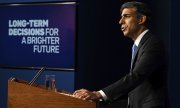London: Sunak scales back climate targets
British Prime Minister Rishi Sunak has announced a watering down of the UK's climate targets. The ban on sales of new diesel and petrol vehicles is to be pushed back by five years to 2035 and the phasing out of gas heating will also be postponed. Sunak cited the excessive costs of environmental measures for citizens as the reason for his move. Pragmatic or backward-looking?
Change of course causes chaos and uncertainty
Sunak's announcement will cause a lot of turmoil, the Salzburger Nachrichten is convinced:
“He sold his changes to the green agenda as realism. But voters could also interpret the move as the inability to put them into practice. ... Sunak didn't just snub climate activists and the international community: many industries on the island also reacted with shock to the change of course. Businesses don't like it when the government pulls the rug out from under their feet, especially when it comes to investing billions in green infrastructure. With this move, the conservative prime minister spread exactly what he supposedly wanted to avoid at all costs: chaos and uncertainty.”
Like a weather vane spinning in the wind
Sunak is just trying to win votes, says The Guardian:
“The man who set out to restore the tattered fragments of his party's reputation for responsibility - wrecked by his two predecessors - has added himself to this list of the most dishonourable, self-interested prime ministers in living memory. Here's the irony: in breaking with Boris Johnson's green policies, he most resembles him as callow and opportunistic, willing to say and do whatever pleases in the moment. ... Change, Sunak proclaimed 31 times in his speech. Change of direction like a spinning weather vane, but the question is whether he and his strategists have read the weather right.”
Correcting previous rash decisions
Unlike his predecessors, Sunak is demonstrating a sense of pragmatism with this change of direction, says The Times:
“It was Boris Johnson, playing as statesman as the United Kingdom prepared to host the Cop26 climate summit, who rushed forward by a decade the ban on new petrol and diesel vehicles. It was Theresa May, in the final weeks of her premiership, who led the desultory 90 minutes of parliamentary debate that waved a legally binding 2050 net zero target onto the statute book. Both decisions were symptomatic of a political culture that has persistently failed to reckon with the true costs of a policy that will fundamentally reshape the Britain's economic landscape.”
Key role model function surrendered
Rishi Sunak is on the wrong track with this U-turn, the Financial Times criticises:
“Britain had shown leadership as the first major economy to enshrine a 2050 net zero target in law. Surrendering the moral high ground gives cover to other big economies to slow their efforts and makes it harder to persuade developing markets to do what is needed. Backtracking is bad, too, for Britain's economy and competitiveness. It will exacerbate the general uncertainty and lack of trust in the government to stick to its commitments that have led to business investment flatlining since 2016.”

